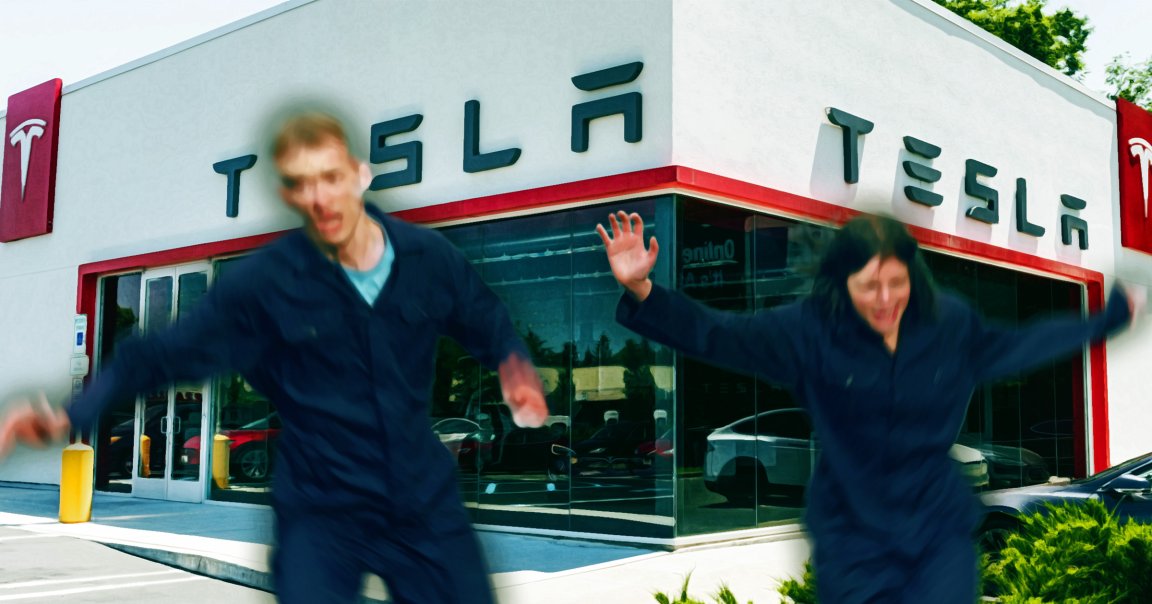
Tesla’s misleadingly-named “full-self driving” (FSD) feature — which still requires drivers pay attention to the road, even if they often fail horrifically at that simple task — is one of the Elon Musk-owned electric carmaker’s biggest self-styled selling points.
Until recently, the boastful multi-hyphenate entrepreneur’s decade-plus of over-promising and under-delivering on assisted driving software did little to tarnish bullish investors‘ slavish devotion to Tesla. But now, as a new survey from the consulting firm Slingshot Strategies found, it looks like the FSD bubble has finally burst, even as Tesla’s abysmal sales and its CEO’s ever-toxic politics threaten to drive the company straight into the ground.
In its monthly Electronic Vehicle Intelligence Report (EVIR), Slingshot surveyed more than 8,000 people across US demographics in August, finding that 35 percent of participants said having FSD included in an EV they were considering for purchase would now make them less likely to buy it. By contrast, only 14 percent said that Tesla’s self-driving suite, which costs either $8,000 upfront or $99 per month, would convince them to purchase a car.
(The final 51 percent couldn’t care less either way, interestingly, lending credence to Musk’s acknowledgement in a July earnings call that the “vast majority of people don’t know [FSD] exists.)
Another fascinating data point: nearly half of the survey respondents said they think the tech — which along with Tesla’s Autopilot feature has been linked to hundreds of crashes, some fatal — shouldn’t be legal at all.
The not-so-self-driving feature has faced ample regulatory scrutiny over safety concerns and its maddeningly misleading brand name.
As The Telegraph reported earlier this year, the United Kingdom decided against letting motorists take their hands off the wheel when self-driving features were engaged. In China, as Reuters reported in March, a one-month free trial of FSD was abruptly suspended pending regulatory approval — and days after, the feature’s name was changed, without fanfare, to “Intelligent Assisted Driving.”
Though the anti-FSD EVIR respondents didn’t provide any reasons why they oppose the feature, some on social offered their own takes.
“Frankly, I don’t see how FSD is legal in the first place,” Philadelphia-based automotive liability attorney Max Kennerly posted. “It’s not certified or approved by anyone.”
Author Edward Niedermeyer, whose book “Ludicrous: The Unvarnished Story of Tesla Motors” massively peeved Musk’s rabid fanboys when it was released in 2019, took aim at the automaker’s financial incentives.
“The problem isn’t consumers, the problem is investors who think Tesla is on the brink of ‘solving self-driving’ and bid up the stock to a trillion dollar valuation,” Neidermeyer posted.
Ever-present at any scene of any FSD criticism, professional Musk-hater Dan O’Dowd, the billionaire founder of the nonprofit Dawn Project that seeks to shut down the feature, suggested in his own post that that “consumers are smart, [and] they do not trust Tesla.”
More on not-so-self-driving: Video Shows Tesla Robotaxi Safety Driver Giving Up, Climbing Into Driver’s Seat